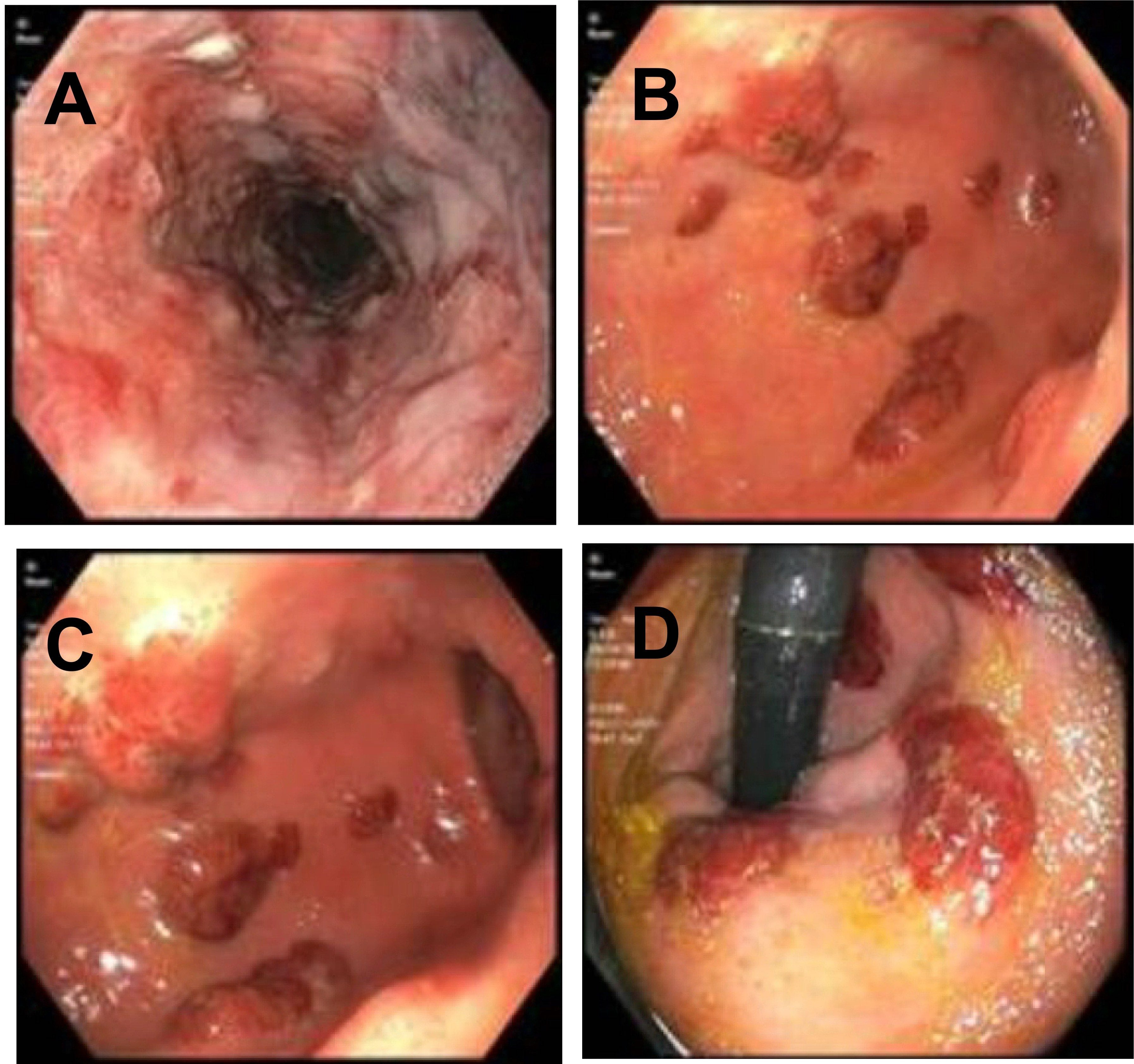Back
Poster Session E - Tuesday Afternoon
E0282 - More Than Skin Deep: Kaposi Sarcoma of the Gastrointestinal Tract
Tuesday, October 25, 2022
3:00 PM – 5:00 PM ET
Location: Crown Ballroom

Dana Toy, MD
University of Southern California
Los Angeles, CA
Presenting Author(s)
Dana Toy, MD, Qi Cao, MD, Hyosun Han, MD
University of Southern California, Los Angeles, CA
Introduction: Although gastrointestinal Kaposi sarcoma is usually asymptomatic, some patients present with abdominal pain and warrant endoscopic evaluation. Here, we report a case presentation of 40-year-old male with no past medical history who presented with a 1-year history of dysphagia, abdominal pain, and decreased oral intake.
Case Description/Methods: Social history was significant for unprotected sexual intercourse. Physical exam was significant right upper quadrant abdominal pain and diffuse painless, purple, maculopapular skin lesions. Initial labs included: WBC 5.2 K/cumm, Hg 12.9 g/dL, MCV 82.5 fL, platelet 220 K/cumm, BUN 16 mg/dL, Cr 0.8 mg/dL, AST 18 U/L, ALT 19 U/L, alkaline phosphatase 87 U/L, total bilirubin 0.3 mg/dL, albumin 3.6 g/dL. Other labs included: positive HIV-1 antibody, HIV-1 RNA 343K copies/mL, CD4 count of 38/cumm. Positive syphilis with 1:1 titer. Chlamydia, gonorrhea, and acute viral hepatitis panel were negative. CT abdomen and pelvis showed thickening of the ascending colon and prominent omental, mesenteric, inguinal lymphadenopathy. On EGD, grade D esophagitis and numerous violaceous lesions seen throughout the gastric antrum, fundus, and duodenal bulb. On colonoscopy, several vascular lesions ranging in size from 2-10 cm from rectum to terminal ileum. Cecal and ascending colon biopsies confirmed Kaposi sarcoma with immunohistochemical stains positive for human herpes virus 8. He was started on highly active antiretroviral therapy (HAART) with emtricitabine, tenofovir, and dolutegravir for HIV as well as atovaquone and azithromycin for prophylaxis after consultation with infectious disease. He was also started on pantoprazole for grade D esophagitis and treated with penicillin G for late latent syphilis. He was discharged and referred to medical oncology. On follow-up, patient has completed multiple cycles of paclitaxel. Dysphagia and abdominal pain have improved.
Discussion: It is important to recognize the utility of endoscopy when patients present with symptomatic gastrointestinal manifestations of Kaposi sarcoma. Visceral involvement of Kaposi sarcoma is associated with poor prognosis. Treatment is usually palliative and aimed at improving symptoms and preventing progression. Depending upon severity and disease burden, HAART is the first-line therapy. Antiretrovirals may decrease proportion of new lesions, promote regression of existing lesions, and improve survival with or without chemotherapy.

Disclosures:
Dana Toy, MD, Qi Cao, MD, Hyosun Han, MD. E0282 - More Than Skin Deep: Kaposi Sarcoma of the Gastrointestinal Tract, ACG 2022 Annual Scientific Meeting Abstracts. Charlotte, NC: American College of Gastroenterology.
University of Southern California, Los Angeles, CA
Introduction: Although gastrointestinal Kaposi sarcoma is usually asymptomatic, some patients present with abdominal pain and warrant endoscopic evaluation. Here, we report a case presentation of 40-year-old male with no past medical history who presented with a 1-year history of dysphagia, abdominal pain, and decreased oral intake.
Case Description/Methods: Social history was significant for unprotected sexual intercourse. Physical exam was significant right upper quadrant abdominal pain and diffuse painless, purple, maculopapular skin lesions. Initial labs included: WBC 5.2 K/cumm, Hg 12.9 g/dL, MCV 82.5 fL, platelet 220 K/cumm, BUN 16 mg/dL, Cr 0.8 mg/dL, AST 18 U/L, ALT 19 U/L, alkaline phosphatase 87 U/L, total bilirubin 0.3 mg/dL, albumin 3.6 g/dL. Other labs included: positive HIV-1 antibody, HIV-1 RNA 343K copies/mL, CD4 count of 38/cumm. Positive syphilis with 1:1 titer. Chlamydia, gonorrhea, and acute viral hepatitis panel were negative. CT abdomen and pelvis showed thickening of the ascending colon and prominent omental, mesenteric, inguinal lymphadenopathy. On EGD, grade D esophagitis and numerous violaceous lesions seen throughout the gastric antrum, fundus, and duodenal bulb. On colonoscopy, several vascular lesions ranging in size from 2-10 cm from rectum to terminal ileum. Cecal and ascending colon biopsies confirmed Kaposi sarcoma with immunohistochemical stains positive for human herpes virus 8. He was started on highly active antiretroviral therapy (HAART) with emtricitabine, tenofovir, and dolutegravir for HIV as well as atovaquone and azithromycin for prophylaxis after consultation with infectious disease. He was also started on pantoprazole for grade D esophagitis and treated with penicillin G for late latent syphilis. He was discharged and referred to medical oncology. On follow-up, patient has completed multiple cycles of paclitaxel. Dysphagia and abdominal pain have improved.
Discussion: It is important to recognize the utility of endoscopy when patients present with symptomatic gastrointestinal manifestations of Kaposi sarcoma. Visceral involvement of Kaposi sarcoma is associated with poor prognosis. Treatment is usually palliative and aimed at improving symptoms and preventing progression. Depending upon severity and disease burden, HAART is the first-line therapy. Antiretrovirals may decrease proportion of new lesions, promote regression of existing lesions, and improve survival with or without chemotherapy.

Figure: (A) Severe grade D esophagitis. (B-C) Numerous purple lesions throughout gastric antrum. (D) Retroflexion with additional violaceous lesions at the gastric fundus.
Disclosures:
Dana Toy indicated no relevant financial relationships.
Qi Cao indicated no relevant financial relationships.
Hyosun Han indicated no relevant financial relationships.
Dana Toy, MD, Qi Cao, MD, Hyosun Han, MD. E0282 - More Than Skin Deep: Kaposi Sarcoma of the Gastrointestinal Tract, ACG 2022 Annual Scientific Meeting Abstracts. Charlotte, NC: American College of Gastroenterology.
